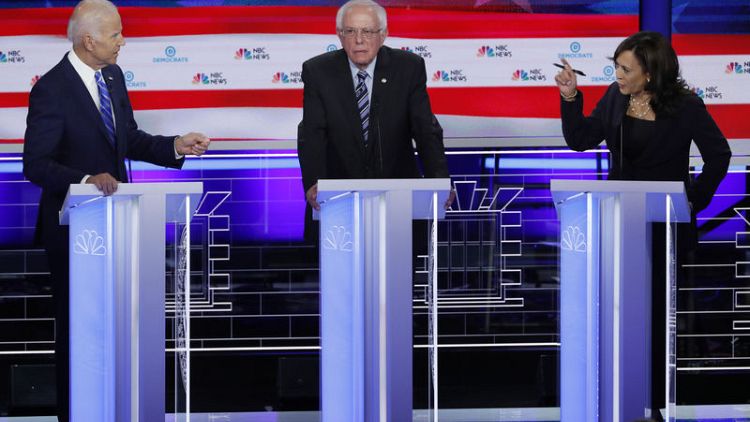By James Oliphant and Ginger Gibson
MIAMI (Reuters) - Democratic presidential candidate Kamala Harris confronted front-runner Joe Biden on race during a debate on Thursday, calling his remarks about working with segregationist senators "hurtful" and questioning his 1970s opposition to school busing.
In a Democratic contest where racial issues have figured prominently, Mayor Pete Buttigeig of South Bend, Indiana, also faced pointed questions about accusations of racism within the city's predominantly white police force in the aftermath of a fatal police shooting of a black man.
Harris, the daughter of a black father from Jamaica and an Indian mother, was at the centre of several heated exchanges during the second night of debates among Democrats vying for the right to challenge Republican President Donald Trump in the November 2020 election.
Harris said the issue of race was deeply personal for her, noting she was abused to school as classes were integrated in California.
She looked straight at Biden and challenged him to explain himself.
"I do not believe you are a racist. And I agree with you when you commit yourself to the importance of finding common ground," said Harris, 54, a U.S. senator from California.
"But I also believe - and it's personal and it was hurtful to hear you talk about the reputations of two United States senators who built their reputations and career on the segregation of race in this country."
Biden, who has faced heavy criticism for his recent comments saying he worked with segregationists decades ago to get things done in the U.S. Senate, defended his record on civil rights.
"It's a mischaracterisation of my position across the board: I did not praise racists. That is not true," he said. "If we want to have this campaign litigated on who supports civil rights and whether I did or not, I'm happy to do that."
"Everything I have done in my career, I ran because of civil rights and continue to think we have to make fundamental changes and those civil rights, by the way, include not just African-Americans, but the LGBT community," he said.
GOING AFTER TRUMP
During the debate, the contenders frequently attacked Trump and sharply disagreed over the best way to boost access to healthcare insurance coverage.
One of the lesser-known candidates, U.S. Representative Eric Swalwell, 38, also trained his sights on Biden, urging the 76-year-old to pass the torch to younger candidates.
"I was 6 years old when a presidential candidate came to the California Democratic convention and said it’s time to pass the torch to a new generation of Americans," Swalwell said. "That candidate was then-Senator Joe Biden."
"He was right when he said that 32 years ago. He is still right today,” Swalwell said.
Biden responded: "I'm still holding onto that torch. I want to make it clear."
Biden and the candidate running second in polls among Democrats, Bernie Sanders, turned their fire on Trump repeatedly.
"The American people understand that Trump is a phony, that Trump is a pathological liar and a racist and that he lied to the American people during his campaign," said Sanders.
Biden, the former vice president making his third run for the White House, said Trump's tax cuts for the wealthy and other economic policies were increasing economic inequality in the United States.
'HORRIBLE SITUATION'
"Donald Trump has put us in a horrible situation. We do have enormous income inequality," Biden said. "The one thing I agree on is we can make massive cuts in the $1.6 trillion in tax loopholes out there, and I would be going about eliminating Donald Trump's tax cuts for the wealthy."
The debate also included U.S. Senators Michael Bennet and Kirsten Gillibrand, former Colorado Governor John Hickenlooper, self-help guru Marianne Williamson and entrepreneur Andrew Yang. All six are polling nationally around 1% or less.
Like the Democrats who debated on Wednesday, the contenders disagreed on the best way to expand healthcare coverage. Asked who would back a plan that eliminated private insurance, only Sanders and Harris raised their hands.
The Democrats frequently talked over one another, shouting to get their points across as some of the lesser-known contenders tried to get noticed.
"Americans don't want to witness a food fight. They want to know how we're going to put food on their table," Harris said at one point.
Sanders defended his big-spending plans for a Medicare-for-All healthcare plan, saying it would reduce premiums for many but that some in the middle class might pay more.
"People who have health care under Medicare for all will have no premiums, no deductibles, no copayments, no out-of-pocket expenses. Yes, they will pay more in taxes, but less in healthcare for what they get," Sanders said.
Buttigieg, who as been grappling with turmoil from the aftermath of the police shooting in South Bend earlier this month, acknowledged that his police force lacked diversity because he "couldn’t get it done."
Buttigieg said the situation around the shooting was a "mess" because the officer did not have his body camera on.
(Reporting by James Oliphant and Ginger Gibson; Additional reporting by Doina Chiacu; Writing by John Whitesides; Editing by Colleen Jenkins and Peter Cooney)
